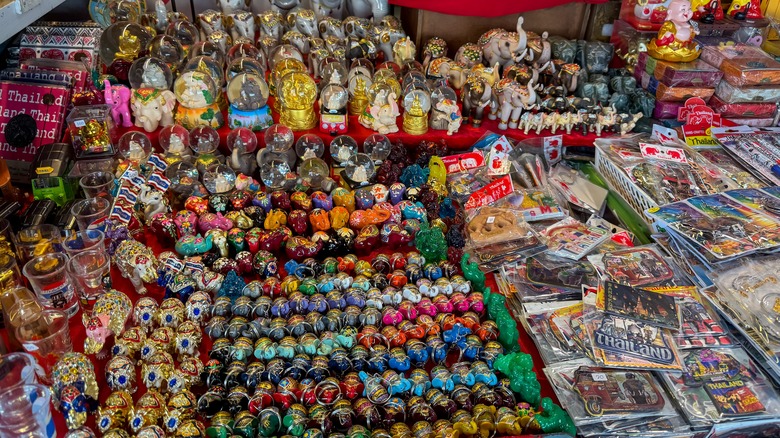DEPOZA 16 Pack Travel Bottles Set - TSA Approved Leak Proof Silicone Squeezable Containers for Toiletries, Conditioner, Shampoo, Lotion & Body Wash Accessories (16 pcs/Black Pack)
$9.99 (as of April 16, 2025 04:30 GMT +00:00 - More info)Have you ever traveled somewhere and been so captivated by the culture that you wanted to take a piece of it home with you? Thailand, with its vibrant markets and stunning temples, is definitely one of those places where you might be tempted to snag a souvenir or two. But before you load up on those Buddha statues, there’s one crucial rule you need to know.

Shop These Accessories for a Comfortable Trip
The One Rule Tourists Should Know Before Buying Souvenirs In Thailand
It’s all about showing respect. Thailand is a country where Buddhism is deeply ingrained in the culture, and that reverence extends to how Buddha images are treated. So, if you’re planning on buying a Buddha statue as a memento, listen up.
Souvenirs and the Law: What You Need to Know Before You Buy.
The rule is that you can’t export Buddha statues or images larger than 12 cm without an export permit from the Office of Archaeology and National Museum Fine Arts Department. This is according to the Act on Ancient Monuments, Antiques, Objects of Art and National Museums (1961). Yes, that’s quite a mouthful. To put it simply, if you’re thinking about buying a larger Buddha image, make sure you’ve got the right paperwork. This applies only to newly made statues or images of Buddha.
Also, be aware that there’s a limit of five items. If you’re thinking of opening up a Buddha statue store back home, think again.
Ancient or historically significant Buddha relics or images can’t be removed from the country under penalty of fine or imprisonment. Those relics are under the custodianship of the state. So, leave those relics where they belong.
| Rule | Details |
|---|---|
| Export Permit for Buddha Images over 12 cm | Required from the Office of Archaeology and National Museum Fine Arts Department |
| Applies to | Newly made statues or images of Buddha |
| Limit | Five items |
| Ancient/Historically Significant Buddha Relics/Images | Cannot be removed from the country under penalty of fine or imprisonment. Under the custodianship of the state |
Why All the Rules?
You might be wondering why Thailand has such strict rules about Buddha images. It boils down to respect and cultural preservation.
Thailand is predominantly a Buddhist country, and the image of Buddha is deeply revered. You’ll notice locals taking great care to show respect in temples, avoiding pointing their feet towards Buddha images or turning their backs on them. It’s all about showing reverence.
The Customs Department restricts the export of Buddha images to prevent thefts of ancient relics from historical sites and to ensure Buddha images are treated respectfully. They’re not just decorative objects; they’re sacred symbols.
New images of Buddha over 12 cm may only be exported with permission for education, worship, or cultural exchange purposes. This is a measure to preserve history and cultural heritage and to combat theft.
The Bottom Line: Is That Buddha Statue Legal?
The general rule is that buying a Buddha image over 12 cm for decor purposes is illegal. While you can buy small Buddha figures, it’s generally considered disrespectful and heavily discouraged.
When you land at Suvarnabhumi Airport (BKK) in Bangkok, you’ll likely see large signs that say something along the lines of, “Buddhist father is not for decoration respect is common sense.” The wording might change, but the message is always the same. When in doubt, err on the side of caution and choose another souvenir.

Shop These Accessories for a Comfortable Trip
Navigating Thailand with Respect: Beyond the Souvenir Shops
Okay, so you know the rules about Buddha statues. But showing respect in Thailand goes way beyond just what you buy. Here are some other things to keep in mind during your trip.
Buddha Bowls and Tattoos: What’s Okay and What’s Not
Have you ever seen a “Buddha Bowl” on a menu? While it might sound harmless, it’s actually considered quite rude in Thailand. Naming a restaurant, dish, or bar after Buddha is seen as commercializing the father of Buddhism, which is disrespectful. Instead, stick to asking for a poke bowl or grain bowl.
Another thing to consider is tattoos. While getting a tattoo to commemorate your travels is a popular trend, you might want to reconsider getting a Buddha tattoo. In Buddhist teachings, the body is considered dirty, making it inappropriate to celebrate Buddha through a tattoo. Plus, there are specific rules about where a Buddha image can and cannot be placed.
For example, a Buddha statue must be placed above your head as a show of humility and respect. A tattoo anywhere on your body means the image is not shown the proper respect.
Dressing the Part: What to Wear (and What to Leave Behind)
When packing for your trip to Thailand, be mindful of your clothing choices. Avoid anything that displays a Buddha image, as it could be considered disrespectful.
Imagine wandering through a temple, soaking in the history and beauty, only to be told that your t-shirt is offensive. Awkward, right? It’s way easier to just pack clothes that are modest and respectful.
General Etiquette Tips: Showing Respect in Everyday Interactions
Here are a handful of quick tips:
- The Wai: Learn how to properly perform the “wai,” a slight bow with your palms pressed together, used as a greeting or to show respect. It’s a small gesture that goes a long way.
- Temples: Remove your shoes before entering temples and dress modestly.
- Heads and Feet: Avoid touching anyone’s head or pointing your feet at people or sacred objects. The head is considered the most sacred part of the body, while the feet are considered the least.
- Public Displays of Affection: Keep public displays of affection to a minimum.
- Loud Noise: Speaking in a loud voice is considered impolite.
- Pointing: Don’t point a single finger at anyone or anything.
- Touching Monks: Women should never touch a monk.
- Photography: Ask for permission before taking photos of people or in sacred places.
- Stay Calm: Remain calm. Showing anger or getting visibly frustrated is considered extremely rude.
- Tipping: Tipping is not expected but is always appreciated for good service.
- Always accept something (food, gift, etc.) with your right hand. It’s considered impolite to accept something with your left hand.

Finding Ethical Souvenirs: How to Shop with a Clear Conscience
So, you want to bring home a piece of Thailand without causing offense? There are plenty of ethical and respectful souvenirs you can buy.
Supporting Local Artisans: A Win-Win Situation
One of the best ways to shop ethically is to support local artisans and craftspeople. Look for handmade items, like textiles, wood carvings, or ceramics. Not only will you be getting a unique souvenir, but you’ll also be helping to support the local economy.
There are markets and shops around Thailand where you will find the artisans eager to sale their wares. Be sure to haggle, they will be expecting it!
Fair Trade Goods: Ensuring Fair Wages and Working Conditions
Another option is to look for fair trade goods. These are items that have been produced in accordance with fair labor standards, ensuring that workers receive fair wages and work in safe conditions.
There are more and more organizations popping up everywhere that are there to ensure there is a clear level of ethics and awareness for travelers. They can help guide you to a shop or market that embraces these ethical standards.
Alternative Souvenirs: Experiences Over Objects
Instead of buying a physical souvenir, consider investing in an experience. Take a cooking class, learn traditional Thai massage, or go on a guided tour of a historical site. These experiences will create lasting memories and give you a deeper understanding of Thai culture.
Maybe consider:
- Thai Cooking Class: Learn to make your favorite Thai dishes and bring the flavors home with you.
- Traditional Thai Massage: Treat yourself to a relaxing massage and learn about the healing techniques.
- Guided Tour of a Historical Site: Explore ancient ruins and temples with a knowledgeable guide.
- Muay Thai Class: Learn the art of Muay Thai (Thai boxing) for a unique physical and cultural experience.
- Scuba Diving Certification: Explore the vibrant underwater world of Thailand with a diving course.
- Rock Climbing Adventure: Test your skills and enjoy the stunning scenery with a rock climbing excursion.
Souvenir Ideas That Aren’t Buddha Statues
Need some ideas for souvenirs that aren’t Buddha statues? Here are a few suggestions:
| Souvenir | Description |
|---|---|
| Thai Silk | Luxurious fabric with intricate patterns |
| Handmade Jewelry | Unique pieces crafted from local materials |
| Thai Tea or Coffee | Authentic flavors to enjoy back home |
| Spa Products | Aromatic oils, balms, and scrubs made with local herbs |
| Hand-Painted Ceramics | Beautiful dishes, bowls, and vases with traditional designs |
| Wood Carvings | Intricate sculptures and figurines |
| Thai Snacks and Spices | A culinary adventure for your taste buds |
| Handmade Soaps | Natural soaps with exotic scents |
| Local Art Prints | Paintings and prints capturing the beauty of Thailand |
| Incense and Oil Burners | Create a tranquil atmosphere with traditional scents and burners |
| Thai Musical Instrument | Unique instruments such as a Khim (Thai hammered dulcimer), or a Angklung (tuned bamboo rattles) |
| Mobile Charms | Beautiful and ornate charms that hang from phones or bags |
| Thai Lanterns | Colorful lanterns will bring a vibrant atmosphere to your home |

A Final Word: Travel with Respect, Leave with Memories
Traveling to Thailand is an incredible experience, and by being mindful of the local culture and customs, you can ensure that your trip is both enjoyable and respectful. So, do your research, pack accordingly, and most importantly, travel with an open heart and mind.






